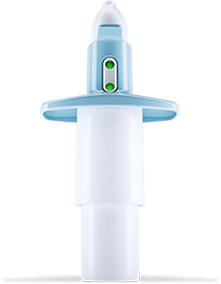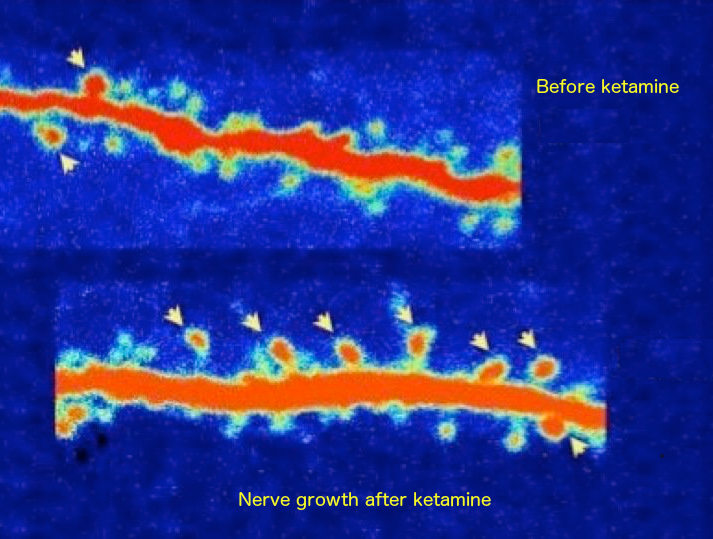Ketamine Infusion Therapy
Ketamine for Depression
Ketamine infusion therapy sessions treat patients with Major Depressive Disorder (MDD) and other mental health disorders. The ketamine infusion stimulates nerve growth within the brain which allows for patients to reflect internally in a tranquil and relaxing environment. During this time the patient will also have a therapy session with Dr. Davila. The combination of the medication and therapy session at Awakenings KC results in 70% successful remission of patients with Major Depressive Disorder (MDD).
Clinical Results
70%
Ketamine infusion therapy sessions treat patients are now offered with SPRAVATO®.
SPRAVATO® is a Ketamine nasal spray as an alternative to injection during treatment. SPRAVATO® is used for the following conditions:
- Adults with treatment-resistant depression (TRD)
- Depressive symptoms in adults with major depressive disorder (MDD) with suicidal thoughts or actions


Other Conditions Ketamine can Treat
In our office, Ketamine Infusion Therapy is for treating Depression. However, research have shown that Ketamine can treat other conditions including:
- Anxiety
- Bipolar Disorder
- Post-Traumatic Stress Disorder
- Chronic pains
- Fibromyalgia
- Rheumatoid Arthritis
- Migraine Headaches
- Neuropathic Pain
Ketamine Compared to Side Effects of Medication
If medication is causing you many side effects, Ketamine is another alternative to all the side effects included with antidepressants. The side effects that could occur during or after the infusion are:
- Feeling drowsy or sleepy
- Dizziness/faintness
- Poor coordination/unsteadiness
- Headache
There is small risk of these side effects because the dosage is quite small. If they are any of these side effects, they generally resolved within 4 to 24 hours after each infusion. For this reason, patients are typically prohibited from driving on the same day.

Ketamine Infusion Therapy
Ketamine is the latest breakthrough to Psychiatry in 50 years in treating depression. Unlike other antidepressants, ketamine has the potential to safely reduce symptoms of depression and suicidality within hours of a single, low-dose infusion. Because of its rapidness and effectiveness, it can improve symptoms even in patients with treatment-resistant depression and other mental health conditions.
Frequently Asked Questions
- What is Ketamine?
- How does Ketamine work?
- How do I know if I am a good candidate for Ketamine treatment?
- What medications interfere with the Ketamine treatment?
- Is Ketamine Treatment FDA Approved?
- Do I need to have someone with me to the treatment?
Ketamine stimulates the development of new receptors and synapses in the brain by interfering with and rebalancing the glutamatergic system to stimulate new synaptic connections. Ketamine works as an NMDA receptor antagonist and an AMPA receptor stimulator.
Ketamine was first used (and still is) as general anesthetic agent. It has been approved to used in the hospitals for the past five decades and has a proven record of safety. Recently, it is being used to treat depression (also PTSD and neuropathic pain) via an IV injection of small doses of ketamine.

Ketamine works by quickly increasing the activity of the neurotransmitter glutamate in the frontal cortex of the brain which allows new synapses to form in the same area. The speediness of ketamine in producing an antidepressant effect occurs because this drug bypasses the traditional serotonin route and goes directly to activating glutamate. This is very different from traditional antidepressants, which first increase the activity of serotonin in multiple different areas of the brain, and then ultimately affect glutamate. This process usually takes two to four weeks to take effect, while ketamine yields an almost immediate effect.
We are more than happy to provide you with an initial evaluation to see if Ketamine Infusion Therapy is a right choice for you. Contact us here
If you suffer from depression and have not had relief with prescription medication or other traditional treatment modalities, then Ketamine Infusion Therapy may be an option for you.
The procedure is easy to administer and essentially pain free.
- Hypersensitivity to Ketamine
- Recent heart attack (less than 6 months ago)
- Recent stroke (less than a year ago)
Prior to arranging for treatment, we would like to speak with you and discuss your current medical issues and medications. You should not adjust your dose or frequency of use of any prescribed medication without first consulting with your prescribing physician.
Yes. The benzodiazepines as listed below will interfere with the treatment:
- Klonopin
- Xanax
- Ativan
- Valium
If you are taking any of the above mentioned at the dose above 100mg per day, you may be asked to skip a dose 24-48 hours before the start of your infusion and wait until 6 hours after before resuming your benzodiazepine.
In addition, there are currently three other medications, which are known to significantly interfere or block the response to ketamine, and these include:
- Lamotrigine (Lamictal)
- Risperidone (Pisperdal)
- Olanzapine (Zyprexa)
They are “relative contraindications” to therapy and may need to be reduced to discontinued prior to treatment.
Not yet.
There are dozens of studies done by researchers from prestigious medical centers and The National Institute of Mental Health for over the past two decades. They have proved ketamine’s safety and efficacy in treating major depressive disorders and suicide ideation. Yet, without very large controlled studies generally required by the FDA to get approval for any psychiatric drug, approval has been delayed. Meanwhile, ketamine is being used as “off label,” as is true with many other medications prescribed by physicians.
Yes.
You will need to have someone who can drive you home after the infusion. However, they do not have to stay with you during the infusion. It is highly recommended you to not drive a vehicle, operate heavy/dangerous machinery, sign any contracts, or partake in other potentially risky activities until the following morning.
- How many infusion treatments will I receive?
- How long is each infusion treatment session?
- Are there any risks or addiction with Ketamine that I should be concerned about?
- Is there anything I need to know prior to the infusion appointment?
- How soon does the Ketamine infusion take action?
- What will I experience from the Ketamine infusion Treatment?
- Will I have to continue to take Ketamine after I complete the treatment program?
- Will I have to stop other antidepressant medications?
- What is the cost?
A total of 6 sessions over six weeks (once a week).
That will maximize the effectiveness of Ketamine infusion therapy. Thereafter, patients can choose to do a maintenance therapy where they return once a month for first year after 6 infusions course. The second year of maintenance would be 1 infusion for every 6 weeks.
40 minutes to an hour
The length of the infusion will be about 40 minutes and you can have a little bit of extra time before discharge.
No.
Ketamine has been proven safe in humans over five decades in and out of hospitals as surgical anesthesia and trauma management. Those patients experience longer exposures and at much higher doses than those used to treat severe depression. Although ketamine has been abused recreationally in high doses as a club drug, but there is no evidence that ketamine is addictive
In fact, ketamine infusion have been found to be remarkably effective in preventing withdrawal symptoms and medication craving. There is current research which indicates that ketamine may be used to combat alcohol, heroin and cocaine addiction.
You cannot eat solid food for 6 hours prior to your scheduled appointment.
However, you may have clear liquids such as water, clear broth, apple juice or clear tea/coffee (no milk or leaves) up to 2 hours before your appointment.
The answer varies from person to person.
Some patients feel the change within an hour of their first infusion. Some can take a day or up to the 2nd infusion to feel the change. Others gradually see the improvements throughout their 6 infusions.
Most patients experience a mild dissociation or inner reflective experience that is tolerated well.
No.
Ketamine infusion therapy is, perhaps, the most exciting and successful new treatment for severe depression. It has been proven effective in most cases, and is available to you and your loved ones. Patients with debilitating severe depression with constant thought of self harm can not afford to wait.
No.
Other antidepressant medications do not interfere with ketamine’s mechanism of action.
It is $450 per infusion. The total of 6 treatments would be $2700.

History of Ketamine
Ketamine was first synthesized in 1962 by Calvin Stevens, an American scientist. The history of ketamine, for medical purposes, began as a replacement anesthetic for phencyclidine (PCP) was needed because of the severe psychotomimetic side effects.
In 1963, ketamine was patented in Belgium. Ketamine was first tested on humans in 1964 and was noted that ketamine produced only minor hallucinogenic side effects by Dr. Edward Domino. Dr. Domino’s wife, Toni, later invented the phrase “dissociative anesthetic” for ketamine. The first report of human and animal use was in 1966.
The US Food and Drug Administration (FDA) approved ketamine for human use in 1970. It was majorly used in battlefield when administered to soldiers during the Vietnam War who required surgical interventions or immediate pain control. In the next three decades, ketamine was used as an anesthetic agent in operating rooms, emergency departments, or intensive care units. Later in 1990s, research on ketamine began its potential as an antidepressant.


